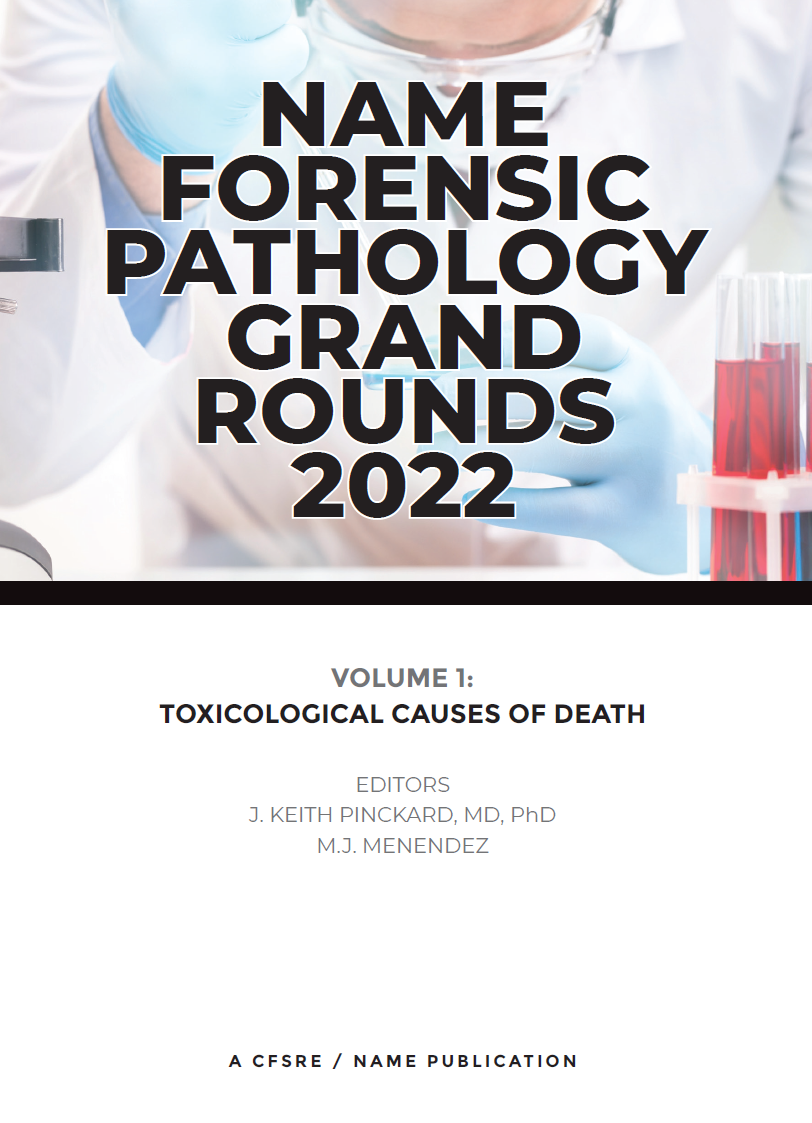Drug-related deaths in the United States continue to increase, especially those involving synthetic opioids. Understanding drug-involved death can be complex, requiring collaboration between forensic toxicologists, medical examiners or coroners, and death scene investigators. The CFSRE focuses on developing assays for the detection and quantification of drugs in postmortem biological matrices, as well as the interpretation of the results. 
Partnering with NAME
CFSRE supports NAME, IACME, and all medicolegal death investigation communities in working to remediate the shortage of Forensic Pathologists in the workforce.
Newly Released eBook
 This collection of forensic toxicology-pathology proceedings is from a series of Grand Rounds presentations on drug/toxin-related deaths given from January through June 2022. The goal of the project was to encourage best practices in the accurate recording of the contribution of drugs and other toxins to death in the United States.
This collection of forensic toxicology-pathology proceedings is from a series of Grand Rounds presentations on drug/toxin-related deaths given from January through June 2022. The goal of the project was to encourage best practices in the accurate recording of the contribution of drugs and other toxins to death in the United States.The Center for Forensic Science Research and Education (CFSRE) and the National Association of Medical Examiners (NAME), with financial support from the National Network of Public Health Institutes (NNPHI) through a cooperative agreement with the Centers for Disease Control and Prevention (CDC), offered this twelve-week series of Grand Rounds presentations.
Download the eBook
NAME Committee Work
MJ Menendez
Chair Strategic Planning Committee and Workforce Subcommittee
This email address is being protected from spambots. You need JavaScript enabled to view it.
Dr. Laura Labay
Chair of Forensic Toxicology Committee
This email address is being protected from spambots. You need JavaScript enabled to view it.
Research
The CFSRE conducts extensive research in conjunction with the medical examiner and coroner offices, as well as other drug testing laboratories, involving various aspects associated with medicolegal death investigation. Postmortem toxicology testing involving drugs and other toxins remains a large area of work for forensic toxicologists, who are often called upon to deliver and interpret analytical findings. Forensic toxicologists are tasked with relaying this information to pathologists and death investigators for correlation with an assessment of cause and manner of death, and sometimes to a judge or jury in a court of law when aspects surrounding drug-related death arise (e.g., drug delivery resulting in death). However, a toxicologist’s interpretation is often based on the results and conclusions from peer-reviewed literature and publications. Understanding the impacts of drugs on biological systems (e.g. humans) requires 1) advanced analytical research to confirm the substance(s) present in various biological matrices, 2) comparative and quantitative data for a case review in collaboration with postmortem examinations, and 3) surveying of the drug landscape as drug trends and combinations change or evolve.A staple in the CFSRE medicolegal death investigation research program is our commitment to comprehensive analytical testing in postmortem scenarios, often including testing for a large number of novel psychoactive substances (NPS) using state-of-the-art instrumentation and analytical techniques. Our research efforts include the development and validation of quantitative testing protocols to help expand knowledge on drugs detected after death. In addition, evaluations regarding drug stability, postmortem redistribution, and other aspects necessary for interpretative matters are commonly conducted.
Benefits
- Medicolegal death investigation research expands upon the information known about drugs and their involvement in drug-related deaths.
- Forensic toxicologists rely on postmortem studies for comparative purposes when evaluating case information and findings and subsequently for interpretation of results.
- Quantitative testing for drugs in medicolegal death investigations provides a frame of reference when determining the concentration at which a drug may become lethal and/or its involvement in other physiological processes discovered at autopsy.
- NPS, specifically synthetic opioids and synthetic cannabinoids, are commonly found in postmortem casework and can go undetected if proper drug testing assays are not employed.
Applications
Methods developed at the CFSRE have been successfully implemented for the detection of drugs in authentic postmortem casework samples. Peer-reviewed literature from our research program is used by forensic toxicologists when writing expert opinions and testifying. The outcomes of our research program continue to positively impact the field of forensic toxicology, both analytically and interpretively.Resources
The CFSRE develops informative open-access resources to contribute to the scientific community, including scientific reports or publications and training or educational materials.CONTINUING EDUCATION TRAINING
Postmortem Toxicology Course for Forensic Pathology Fellows and Toxicologists
September 11-14, 2024
This program is designed for forensic pathologists and toxicologists and focuses on the pharmacology and toxicology of the major classes associated with drug-caused and related deaths.
Investigation and Certification of Drug Toxicity Deaths in Today’s Complex Drug Environment
Module I
MODULE II Module III
On-Demand
This extensive three-module series focuses on the investigation and certification of drug-related deaths made possible by financial support from NNPHI and an agreement with the CDC.
Forensic Pathology Grand Rounds 2022: Toxicological Causes of Death
On-Demand
This 12-part series is designed to highlight the certification of both common and complex deaths involving drugs and other toxic agents and was made possible by financial support from NNPHI and an agreement with the CDC.
Forensic Pathology Round Table
Do you want to become a Medical Examiner?
- The National Association of Medical Examiners (NAME): So You Want to be a Medical Detective?
- Becoming a Forensic Pathologist: The Stories of People Who Have Done It
- Becoming a Forensic Pathologist, The Story Continues…
- You, Too, Can Be a Medical Doctor With a Specialization in Forensic Pathology! Talk to the Experts and Start Your Journey!
Publications/Presentations
Peer reviewed publications
- Barry K. Logan, Amanda L.A. Mohr, Melissa Friscia, Alex J. Krotulski, Donna M. Papsun, Sherri L. Kacinko, Jeri D. Ropero-Miller, Marilyn A. Huestis. Reports of Adverse Events Associated with Use of Novel Psychoactive Substances, 2013–2016: A Review. Journal of Analytical Toxicology, Volume 41, Issue 7, September 2017, Pages 573–610, https://doi.org/10.1093/jat/bkx031
- Alex J Krotulski, Donna M Papsun, Melissa Friscia, Jennifer L Swartz, Brian D Holsey, Barry K Logan. Fatality Following Ingestion of Tetrahydrofuranylfentanyl, U-49900, and Methoxy-Phencyclidine. Journal of Analytical Toxicology, Volume 42, Issue 3, April 2018, Pages e27–e32, https://doi.org/10.1093/jat/bkx092
- Alex J. Krotulski, Donna M. Papsun, Carolina Noble, Sherri L. Kacinko, Barry K. Logan. Brorphine—Investigation and quantitation of a new potent synthetic opioid in forensic toxicology casework using liquid chromatography‐mass spectrometry. Journal of Forensic Science. Early View. https://doi.org/10.1111/1556-4029.14623
- Alex J Krotulski, Donna M Papsun, Sherri L Kacinko, Barry K Logan. Isotonitazene Quantitation and Metabolite Discovery in Authentic Forensic Casework. Journal of Analytical Toxicology, Volume 44, Issue 6, July 2020, Pages 521–530, https://doi.org/10.1093/jat/bkaa016
- Alex J Krotulski, Donna M Papsun, Melissa Friscia, Jennifer L Swartz, Brian D Holsey, Barry K Logan. Fatality Following Ingestion of Tetrahydrofuranylfentanyl, U-49900 and Methoxy-Phencyclidine. Journal of Analytical Toxicology, Volume 42, Issue 3, April 2018, Pages e27–e32, https://doi.org/10.1093/jat/bkx092
- Alex J. Krotulski, Amanda L.A. Mohr, Sherri L. Kacinko, Melissa F. Fogarty, Sarah A. Shuda, Francis X. Diamond, William A. Kinney, M.J. Menendez, Barry K. Logan. 4F‐MDMB‐BINACA: A New Synthetic Cannabinoid Widely Implicated in Forensic Casework. Journal of Forensic Science. Volume 64, Issue 5, September 2019, Pages 1451-1461. https://doi.org/10.1111/1556-4029.14101
- Donna M Papsun, Alex J Krotulski, Joseph Homan, Keith D H Temporal, Barry K Logan. Flualprazolam Blood Concentrations in 197 Forensic Investigation Cases. Journal of Analytical Toxicology, bkaa070, https://doi.org/10.1093/jat/bkaa070
- Alex J Krotulski, Donna M Papsun, Chris W Chronister, Joseph Homan, Michele M Crosby, Jennifer Hoyer, Bruce A Goldberger, Barry K Logan. Eutylone Intoxications—An Emerging Synthetic Stimulant in Forensic Investigation. Journal of Analytical Toxicology, bkaa113, https://doi.org/10.1093/jat/bkaa113
Presentations
- Barry K. Logan, Donna M. Papsun, Alex J. Krotulski, Sherri L Kacinko. A Novel Benzimidazole μ-Opioid Agonist as the Latest Novel Opioid. Society of Forensic Toxicologists. 2020 Annual Meeting. Platform Presentation.
- Judith Rodriguez Salas, Alex J. Krotulski, Reta Newman, Jon R. Thogmartin, Amanda L.A. Mohr, Barry K. Logan. Concentrations of para-Fluorofuranylfentanyl in Central and Peripheral Blood from Postmortem Death Investigations. Society of Forensic Toxicologists. 2020 Annual Meeting. Platform Presentation.
- Alex J. Krotulski, Susan Varnum, Barry K. Logan. Data-Supported Poly-Drug Use Among Fentanyl Users: A Toxicology Perspective. American Academy for Forensic Sciences. 2020 Annual Meeting. Platform Presentation.
- Barry K. Logan, Meaghan P. Drumm, Denice M. Teem, Sherri L. Kacinko. Quantitation of Tianeptine and its Metabolite in Blood and Urine by LC-MS/MS. Society of Forensic Toxicologists. 2019 Annual Meeting. Platform Presentation.
- Melissa F. Fogarty, Amanda L. A. Mohr, Donna Papsun, Barry K. Logan. Method of Development and Validation of U-Type Opioid (Utopioid) Series Compounds and their Identification in Authentic Case Samples. Society of Forensic Toxicologists. 2019 Annual Meeting. Platform Presentation.
- Eduardo Geraldo De Campos, Melissa Fogarty, Bruno DeMartinis, Barry K. Logan. Comprehensive Screening of Traditional and Novel Psychoactive Substances in Postmortem Dried Blood Spots Specimens by UHPLC-QToF-MS/MS. Society of Forensic Toxicologists. 2019 Annual Meeting. Poster Presentation.
- Judith Rodriguez Salas, Amanda L. A. Mohr, Melissa F. Fogarty, Barry K. Logan. Retrospective Datamining of Novel Opioids Using Previously Acquired Data by Liquid Chromatography Time of Flight Mass Spectrometry (LC-TOF-MS). Society of Forensic Toxicologists. 2019 Annual Meeting. Platform Presentation.








